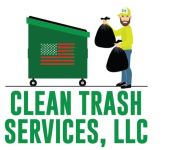Properly disposing of hazardous household waste is crucial for protecting your health, your community, and the environment. Many common household items contain harmful substances that require special handling to ensure they don’t cause harm. Clean Trash Services is committed to helping you dispose of these items safely and responsibly. Here’s a comprehensive guide on how to manage hazardous household waste.
1. Identify Hazardous Household Waste
The first step is recognizing what constitutes hazardous household waste. Common items include:
- Batteries (alkaline, lithium, and rechargeable)
- Paints and solvents
- Pesticides and herbicides
- Household cleaners and disinfectants
- Motor oil and antifreeze
- Electronics (e-waste)
- Fluorescent light bulbs
- Medications
2. Read Labels Carefully
Check the labels on household products for disposal instructions and hazard warnings. Words like “danger,” “warning,” “caution,” and “poison” indicate that the item is hazardous and requires special disposal methods.
3. Don’t Mix Hazardous Wastes
Never mix different hazardous wastes together. Mixing can cause dangerous chemical reactions, making disposal even more hazardous. Keep them in their original containers whenever possible to avoid accidents.
4. Use Local Hazardous Waste Collection Programs
Many communities offer hazardous waste collection programs or special drop-off events. These programs are designed to handle hazardous materials safely. Clean Trash Services can provide information about local collection sites and dates, ensuring you know where to take your hazardous waste.
5. Store Hazardous Waste Properly Before Disposal
While waiting to dispose of hazardous items, store them in a safe, secure location. Keep them away from children and pets, and ensure containers are sealed tightly to prevent leaks.
6. Utilize Clean Trash Services for Safe Disposal
At Clean Trash Services, we offer specialized hazardous waste disposal services. Our team is trained to handle and dispose of hazardous materials following local regulations and safety guidelines. We ensure that these items are treated correctly, minimizing their impact on the environment.
7. Recycle When Possible
Some hazardous waste items, such as batteries and electronics, can be recycled. Clean Trash Services partners with recycling facilities to ensure that recyclable materials are processed correctly, reducing landfill waste and conserving resources.
8. Dispose of Medications Safely
Do not flush medications down the toilet or throw them in the trash. Many pharmacies offer take-back programs for unused or expired medications. Clean Trash Services can also guide you to local medication disposal sites.
9. Handle Paint and Solvents with Care
Unused paint and solvents should be taken to a hazardous waste collection site. Some communities offer paint recycling programs. If you have small amounts of leftover paint, you can solidify it with cat litter or a paint hardener before disposing of it with regular trash, but always check local guidelines first.
10. Educate Yourself and Your Family
Understanding the risks and proper disposal methods for hazardous household waste is crucial. Educate your family about the dangers and safe handling practices. Clean Trash Services offers educational resources and advice to help you manage hazardous waste responsibly.
